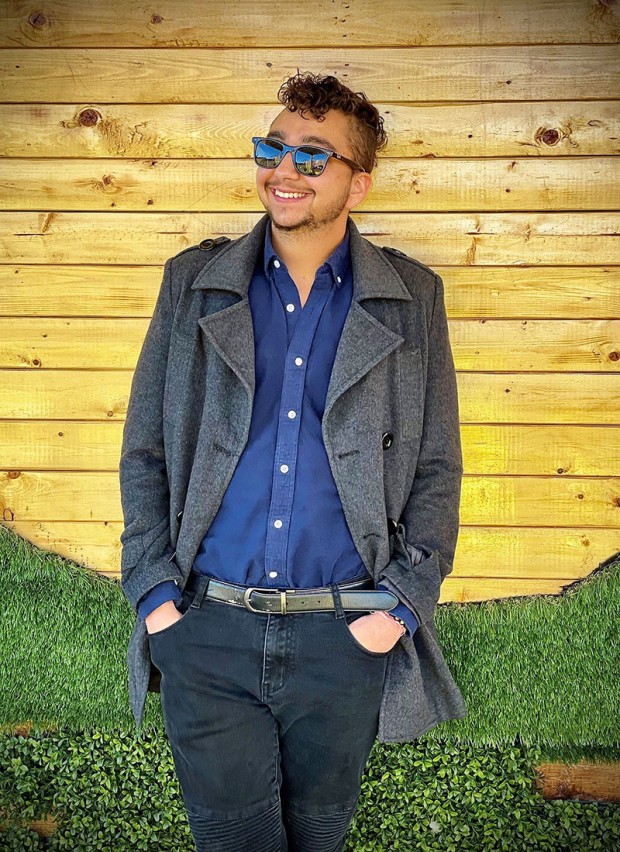Becoming Hasan: From Confusion to Clarity

Hasan Martin Seth has not had a good cry for 18 months. It is not for want of trying. The 26-year-old real estate investor has recruited his friends in the effort, asking them to share sad stories or play melancholy music. He even tried eating chili peppers to activate his tear ducts. Nothing works. The testosterone shots Hasan administers to himself twice a month seem to preclude it.
Not crying is “a good thing, but it’s also a weird thing,” said Hasan, tugging on the gold chain around his neck – a gift from his father. “I just need an emotional release,” he continued. “I’m very self-aware. I have to be because I never want to get back into that dark space I was in for so many years.”
For the first 22 years of life, Hasan was Hasanthi – a daughter, sister, and girlfriend. It never felt quite right.
As a child growing up in San Diego, Hasan, who is half Indian and half white, hated wearing skirts, a mandatory part of the school uniform. When Hasan was in fifth grade, the family moved to Bellaire, where father Sandeep set up a private legal practice and mom Holly worked as a teacher. Hasan’s abhorrence for feminine attire persisted.
At Indian weddings, Hasan protested against wearing brightly colored saris and heavy lehengas – and would have felt more comfortable in a suit and tie. And during recess at Horn Elementary School, when teachers would separate students by gender, Hasan followed the boys. Teachers walked an upset Hasan back over to the girls.
“I was angry and confused,” said Hasan. “I didn’t understand why it had to be that way.”
Neither Hasan nor the community seemed to have the vocabulary or insight to reckon with the fact that, though born a girl, Hasan always felt like a boy. Family members chalked up Hasan’s love for lacrosse and the drums to tomboyishness. At the time, transgender was not common parlance.
“We didn’t know the internal strife,” said Hasan’s mother, Holly.
By middle school at Pin Oak, Hasan was definitely attracted to women, but unsure of what to do about it, kept it quiet. After coming out as lesbian during sophomore year at Bellaire High School, Hasan’s life proceeded just the same.
Hasan remained close friends with bandmates like Matthew Espinosa – they had dated freshman year. Matthew later came out as gay. “When we both came out, there were no hard feelings,” said Matthew, who grew up in Meyerland and now lives in Sugar Land with his husband. “I think after we came out, we really bonded.”
BHS was among the first high schools in Texas to create a gay-straight alliance, a student-led organization intended to provide a supportive environment for lesbian, gay, bisexual, and transgender students along with their allies, and this sense of openness and respect percolated in the school’s hallways. If anyone did condemn homosexuality, Hasan had a crew of theater and band friends for protection, along with a younger brother who become a proud ally of the queer community.
Aiding in Hasan’s feeling of security was mom Holly, who was then a science teacher at BHS. When she learned that Hasan identified as lesbian, the two exchanged a heartfelt moment of laughter and tears.
“Even before I told my mom, she knew,” Hasan said with a laugh. “Moms know everything.”
More challenging, Hasan felt, would be coming out to dad Sandeep, who was born and raised in India. Hasan feared his reaction but wanted him to know the truth.
“I was feeling a lot of anxiety and depression, so I wanted my dad to know what was going on,” said Hasan. One evening, Hasan went into the master bedroom to talk to Sandeep. The words spilled out: “I’m gay.”
“I remember [my dad] looked really serious. I was just kind of sitting there for what felt like a whole minute.”
Sandeep then instructed Hasan to get in the car. It was dark outside, and Hasan was wary of what was about to happen. “I’m thinking maybe he’s going to drop me off at my aunt’s house, or just kick me out of the house. You hear horror stories of people coming out [as gay], and that’s what’s running through my mind.”
Hasan got in the car, crying. On the radio, Lady Gaga’s “Born This Way” started playing, fitting since the song, which had been released earlier that year, is about self-empowerment for the LGBTQ community. “It’s such an important song for me and my community, so I started crying even more.”
Sandeep pulled into a parking lot and then ordered Hasan to get out of the car. “We got out of the car,” said Hasan, “and we’re at Twin Peaks,” a sports bar where waitresses wear revealing uniforms. “My dad was like, ‘I love you. I just want you to be a good person. Everything will be okay. So let’s just eat some wings and check out hot girls.’”
Sandeep does not recall this incident in detail, although he does remember taking Hasan to Twin Peaks. It did not take long for Sandeep to wholeheartedly accept Hasan’s sexual orientation.
“It wasn’t that difficult because, you know, it’s like, ‘Oh, you like women? I like women. I can understand that,’” said Sandeep.
After spending a gap year traveling in France and India, Hasan started college at The University of Texas at Austin. While there, Hasan joined Pearl Street Co-op, a joint living space with men and women, or, as Hasan calls it, “a hippie fraternity.” Weekends were spent playing shows with a band, Risky Motion, and weekdays were for studying international relations. Hasan was open about being a lesbian – dressing in suits and ties most days – and had plenty of friends. Still, feelings of insecurity remained.

Music has always been an important part of Hasan’s life. Here, Hasan is pictured playing the quads with the Bellaire High School band.
“I didn’t tell anyone about how I was feeling on the inside,” said Hasan. “That there was more to it. That I thought I was a boy.”
After sophomore year, Hasan accepted an internship with the mayor’s office in Paris, France, and then decided to study for a semester at University Paris-Est Créteil.
One night in Paris, Hasan was at Highlander, a local pub he had frequented during the gap year before college. Sitting near the dart boards, Hasan noticed an attractive woman and started up a conversation. She began telling Hasan her life story: that she was born a man but always wanted to be a woman. With the help of doctors, she was prescribed estrogen shots, and soon, her physical appearance began to match her internal gender identity.
Hasan started crying. “I’ve felt that same way since I was 4 or 5 years old,” Hasan recalls telling the woman. “I just didn’t know it was a thing. I didn’t know it was allowed, or that other people felt that way.”
Hasan got home that night and started Googling, watching time-lapse YouTube videos of transgender men, showing how their bodies transformed in response to testosterone treatment and top surgery. Videos showed an hourglass-figured-person with breasts and soft features transform into a muscular masculine frame with a flat chest, facial hair, and a square jawline.
Over the next several nights, Hasan watched more videos. Some nights, Hasan would lay in bed crying, thinking he’d never have the will to go through such an intense transformation. Other nights, he felt empowered. He saw the future he wanted and would do what it took to make it happen.
On a Skype call from France, Hasan, then 22, explained his gender dysphoria to his parents for the first time. He was crying, and his then-girlfriend Chelsea sat by his side offering comfort and support. Hasan’s parents, meanwhile, sat confused. They thought perhaps the feeling would disappear.
“For me, the initial reaction was a complete and total breakdown,” said Holly. “[I was] bawling, just not wanting it to be true.”
“I was totally clueless,” added Sandeep. It would take months for Holly and Sandeep to fully grasp that the person they had always called their daughter wanted nothing more than to be a son.
Hasan’s teenage brother Vikram, then a rising freshman at UT Austin, braced himself for what he knew would be a tough road ahead.
“My first thought was really twofold,” said Vikram, “which was, wow, I will be there to support you always. But the second thought, and the more pervasive thought, was wow, life is about to get pretty hard for a little bit.”
Hasan is one of more than 1.4 million American adults who identify as transgender, defined as people whose gender identity differs from the sex they were assigned at birth. Many people who are transgender suffer from gender dysphoria, an intense feeling of discomfort or distress, akin to anxiety or depression. Gender dysphoria can cause one to feel hopeless, even suicidal. In one study, more than half of transgender male teens reported attempting suicide, and 30 percent of transgender female teens said they attempted suicide.
Hasan and his younger brother Vikram have always been close, exchanging career advice, dating tips and more.
Hasan said he experienced feelings of discomfort as an adolescent as a result of his confusion about his gender identity. At high school football games, he’d overhear bandmates discussing the latest drama – who was dating who, or who liked who. Hasan would go home, dejected, and then lay in bed crying, fearful of never having a girlfriend. As the token out lesbian at BHS, opportunities to date women or even interact with people with similar struggles were limited. And deep down, Hasan did not feel right in this female body.
On top of gender dysphoria, many transgender youth, along with teens who identify as lesbian, gay, or bisexual, experience rejection when they come out to family and friends. According to some research, one in four LGBTQ teens in the U.S. gets kicked out of their homes when they come out to their parents, and 68 percent experience “family rejection.” For some, religious beliefs can become obstacles to supporting someone who is gender non-conforming.
Hasan considers himself lucky. He remembers that his mom used to take him to Hatch Youth at the Montrose Center in Houston back in high school. The group offers a safe social environment for LGBTQ adolescents, ages 13-20.
“I’d go every Friday for a couple of hours, and it was an open space for me to meet people,” said Hasan. Holly, meanwhile, attended meetings for PFLAG, an organization and support group for parents and families of gay, lesbian, transgender, bisexual, and queer people. She said the meetings were useful, and she wishes she continued to attend them after Hasan came out as transgender.
“I just didn’t feel like talking about it,” said Holly. “But it probably would have helped me.”
She added that the best thing a parent can do when their child comes out as gay, transgender, or gender nonconforming is to “move towards acceptance right away.”
“I think it just makes it so much harder when you think ‘oh, this can’t be real’ or ‘oh, this is not going to last,’” said Holly, who says she had those thoughts at first. “If they have gotten to the point where they have the courage to tell you, then it is real. You’ve got to do your best to think: What is the end goal? The end goal is that a child is happy. There’s no better end goal. So you have to keep your eyes on that prize through the difficult times.”
For Hasan, coming out to his parents was one step in a longer, more difficult gender transition. First, Hasan asked his friends, brother, and cousins to start using he, him, and his pronouns. He also asked them not to call him Hasanthi, but instead, Hasan, a shorter version of his birth name, which translates to “laughing one.”
The shift was difficult, said Vikram. Suddenly, Vikram had an older brother instead of an older sister.
“In a sense, it’s the death and rebirth of a person,” said Vikram, who says he initially felt awkward around Hasan, who had been his closest friend for 22 years.
Hasan, meanwhile, was envious of Vikram. Why did Vikram get to have a thick black beard and a male voice, while Hasan was stuck in a body that felt like someone else’s? Hasan recalls yelling at his brother after late nights partying in Austin, projecting his anger onto someone who he, in truth, admired deeply.
In the months after he graduated from college in 2018, Hasan felt lost, identifying as a man but appearing as a woman. He floated between San Diego, San Francisco, and Austin, in jobs that lasted no more than a few months. Hasan recalled an employer who refused to use his preferred pronouns, a man who beat him up for using the men’s restroom, and a horrifying incident of being violently assaulted.
“That obviously contributed to my depression and confusion for a while,” said Hasan. “So yeah, there’s been a lot that I’ve had to overcome.”
Each trans person’s gender transition looks different, and some do not choose to transition at all. Possible steps can include changing one’s clothing or one’s name, or undergoing medical procedures like hormone therapy and surgery to change one’s physical characteristics.
According to the 2015 U.S. Transgender Survey Report, nearly 80 percent of trans people said they would like hormone therapy but only about 50 percent actually received it. Gender-confirming surgery is even less common.
Among trans men who took the 2015 survey, about 20 percent had chest reduction or reconstruction, and only two percent had genital surgery. Cost and lack of health insurance is often a barrier.
Hasan feels lucky that he had the resources to seek medical treatment.
In preparation for the testosterone hormone therapy Hasan would soon start, he, with the help of his cousins, explained to all of his aunts and uncles, grandparents from India, and other extended family that he was about to begin the physical transition process. For some of them, the transition was easy to accept. Hasan was particularly impressed with his Indian grandfather who, to this day, has not once called Hasan by the wrong name or pronoun.
It turned out that the pronouns were hardest for the people closest to home. “I would form sentences around not having to use [pronouns],” said mom Holly. “I don’t know why the pronouns were so hard. I guess what makes him a boy was the pronoun, in my head. We had some fights about it. He would get so angry that we were messing up. We had some long talks about it.” Holly would say, “Look, we’re doing our best. This is hard on us. And you just need to respect that. You know, we are working hard.”
On March 3, 2019, Hasan received his first testosterone shot. His mom, who had switched careers from teaching to nursing by that point, administered the shot into Hasan’s thigh and taught him how to do it himself. Hasan, afraid of needles, still cringes when he talks about self-administering the shots twice per month. Within a few months, Hasan’s voice dropped several octaves. He grew facial hair, and his body changed – broader shoulders, narrower hips, a stronger jawline. With each change, Hasan’s confidence grew.
At the same time, Hasan started to put more energy into his work, and he discovered a passion for real estate. He had taken a job in property management and decided that he wanted to pursue a career in real estate investing.
Hasan still felt uncomfortable in his body. For nearly two years, he wore chest binders in an effort to hide his breasts, but he wanted something permanent. In December, Hasan scheduled top surgery, a $12,000 intensive procedure to remove his breast tissue. Hasan created a GoFundMe, and raised almost $5,000 through donations from friends, family, and coworkers. His parents covered the rest. It’s a gift he still struggles to fathom.
“I don’t understand how I got this lucky,” he said, shaking his head in disbelief. “[The surgery] is just so far from reality for so many trans people.”
For now, Hasan is not planning on seeking genital surgery, which costs upwards of $20,000. He said he wants to wait to make that decision when technology is more advanced. “I’m not willing to take that medical risk,” he said. “I’m really confident and comfortable in my manhood for now.”
With a literal weight off his chest, Hasan drove from Austin to Las Vegas last January. Hasan’s dad helped him coordinate a mentorship with Austin Mao, who runs a property-management company called AirREI.

In 2020, Hasan moved to Las Vegas, where he is pictured here. He plans to start his own real estate investment and property-management company based out of Las Vegas.
Hasan began doing contract work for the company, which offers vacation rental homes in Las Vegas. He was captivated and was soon putting in 80 hours a week as a project manager, a time commitment made easier by the global pandemic, which put social gatherings on hold. Hasan was quickly promoted to general manager of the company.
“I loved the job so much that I was succeeding in the role way beyond my expectations,” said Hasan, who is now in the throes of launching his own real estate investment and property-management company based out of Las Vegas.
Hasan’s family watches with awe. Vikram loves seeing Hasan’s Instagram posts, which Vikram takes as proof that his brother is finally confident in his own skin.
“I respect it. I’m, like, that’s my brother properly feeling himself for the first time in 20 years,” said Vikram. “It really just came down to the transition. That was the one piece of the puzzle he needed to achieve self-confidence.”
It is not just self-confidence that Hasan has developed with his transition. His relationships with his family have improved. He and Vikram are closer than ever, talking on the phone regularly to share tips on weightlifting, dating, and career development. Vikram even taught Hasan how to shave. “I had no idea where to draw my neckline,” Hasan jokes as he scratches his beard.
Vikram is constantly aware that his own life is, by definition, easier than his brother’s. Never has someone assaulted him for using the men’s restroom, nor has anyone refused to use the correct pronouns with him – both are experiences Hasan has had. Vikram hardly thinks about growing a beard. It just comes naturally.
Meanwhile, Hasan is trying to manage the side effects from the testosterone shots, most recently, a high red blood cell count. He has to donate blood every three months to manage it, an inconvenience and a recurring source of anxiety since he hates needles.
Sometimes, Hasan fears that he will never find love. Dating as a transgender person has proven difficult. On dating apps like Tinder and Bumble, Hasan openly identifies himself as transgender in an effort to be transparent.
But he finds that few people are open to dating a trans person. “No offense, but dating apps were made for straight cisgender people,” Hasan said. What is he doing about it? He is working on creating an app for transgender people and people who are open to dating transgender people.
This – Hasan’s passion to make life better for other transgender people – is what drives him most. It is part of why he is starting his own business, working more than 60 hours a week. And it is also why he sat down with me so many times to share his story. He wants other transgender and gender-nonconforming people to know that they too can thrive while being themselves.
“With all of the stuff we have to worry about just being trans and all of the emotional trauma and the hatred, it’s a lot,” said Hasan. “I want people to be able to see that I can make a life for myself in whatever career I want to hold because I am not going to be ostracized. I am not going to be discriminated against. And even if I am, I am going to break through those barriers and be okay. I will be okay.”
Want more buzz like this? Sign up for our Morning Buzz emails.
To leave a comment, please log in or create an account with The Buzz Magazines, Disqus, Facebook, or Twitter. Or you may post as a guest.




